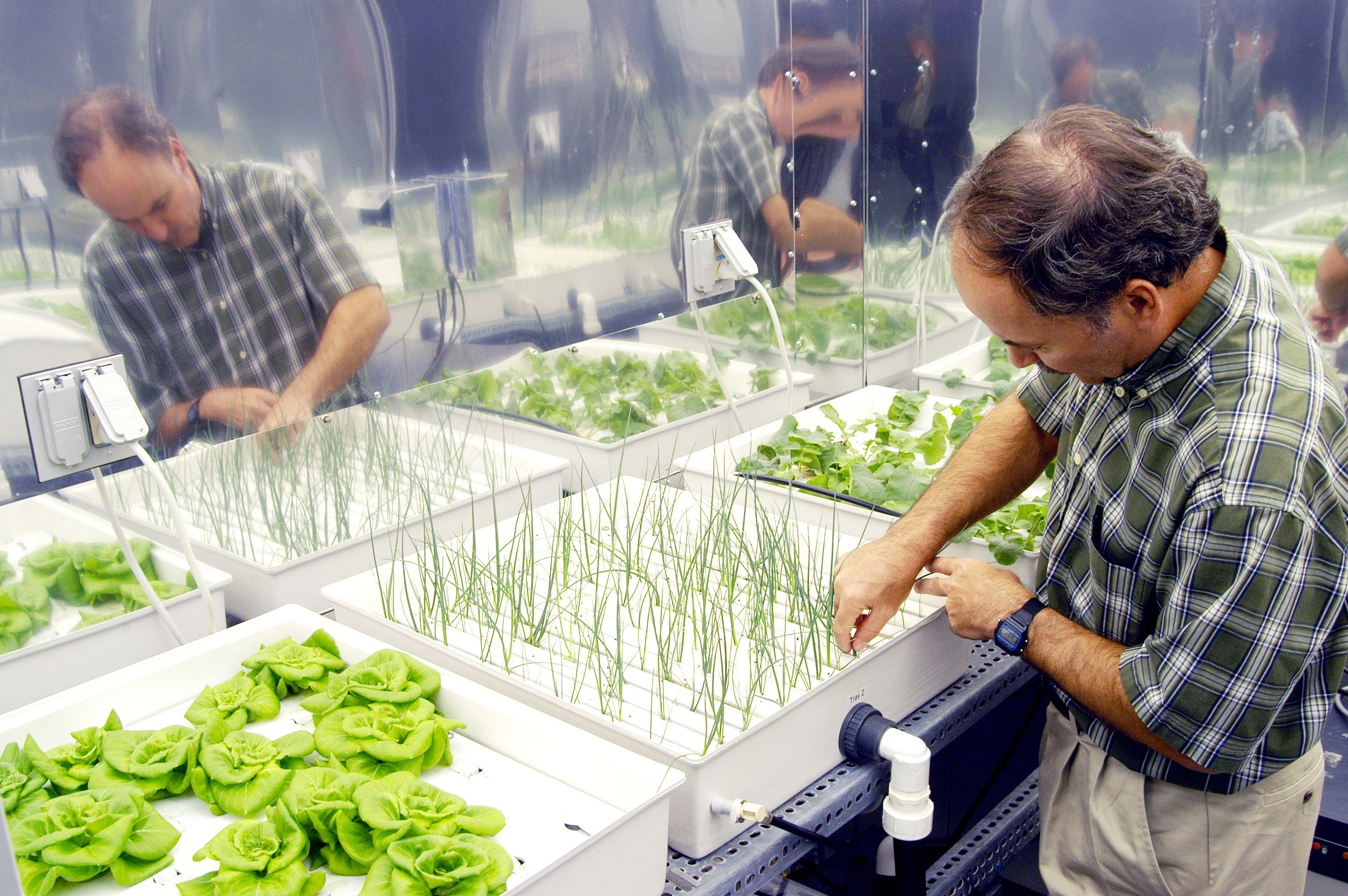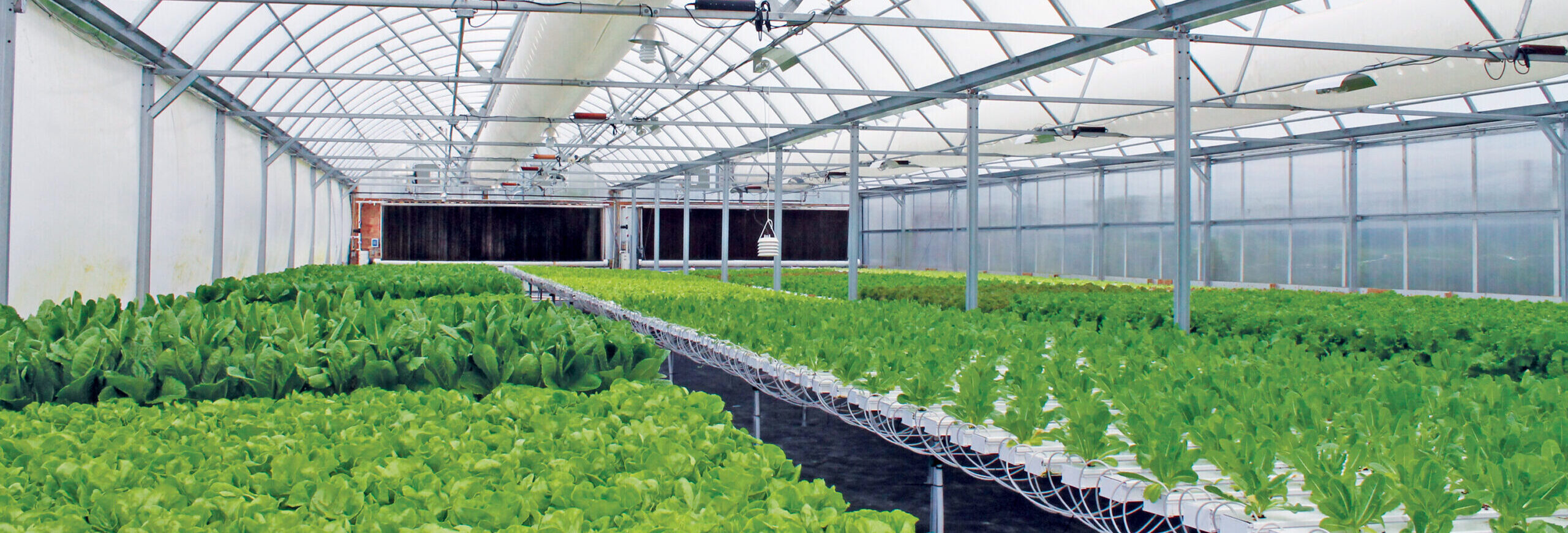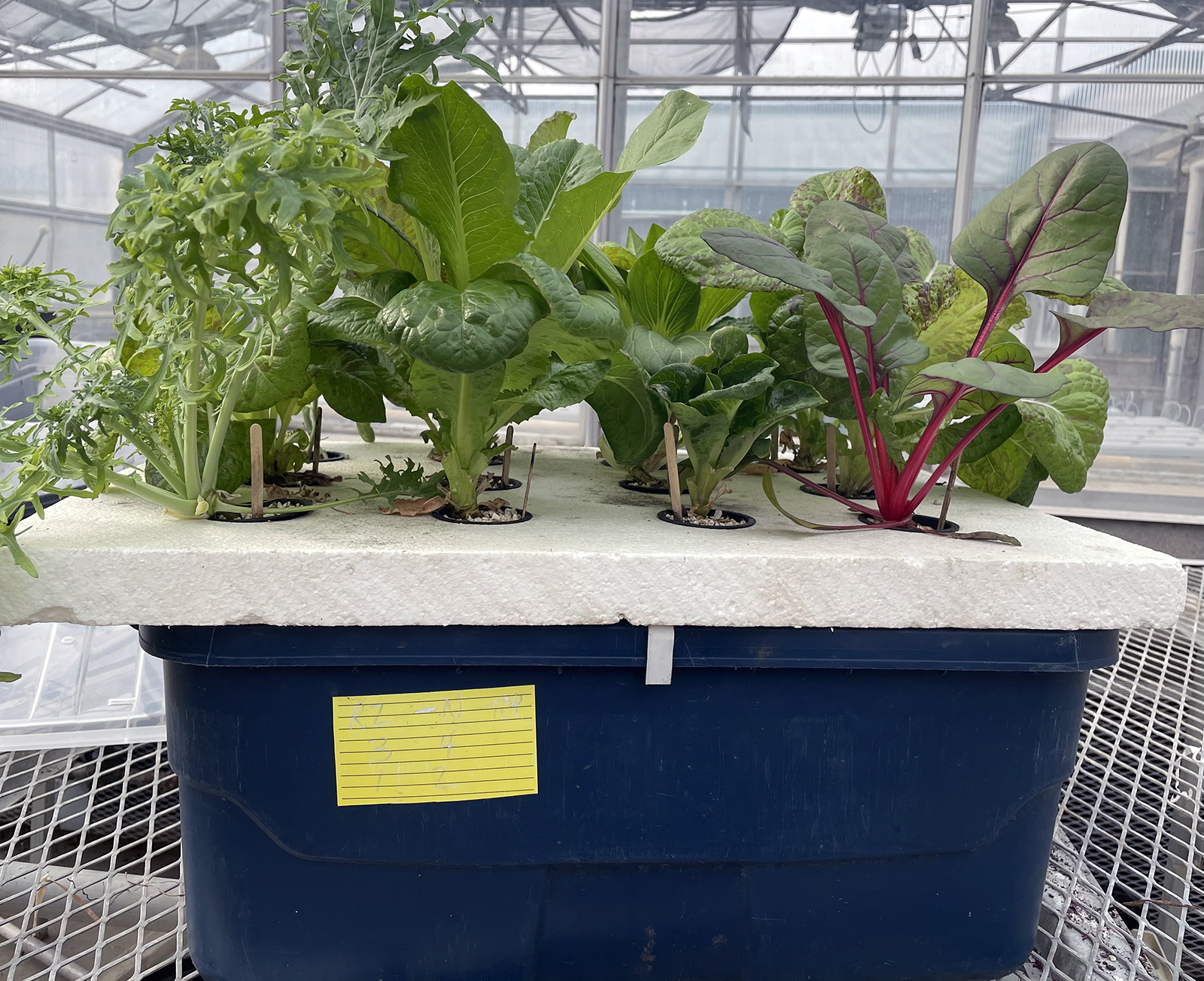Are you tired of traditionally grown produce not meeting your taste and quality expectations? Are you concerned about the environmental impacts of conventional farming methods? If you answered yes to any of those questions, then it is time for you to explore the fascinating world ofCommercial Hydroponics! In this blog post, we will delve into the intriguing science behind commercial hydroponics as a sustainable and efficient solution for growing high-quality produce in today's fast-paced, environmentally-conscious world. As we look ahead to the future of agriculture, we invite you to join us in discovering an innovative method that revolutionizes the way we grow, consume, and think about food. So, grab your metaphorical overalls and let's embark on this journey together, shall we?
1. What is Commercial Hydroponics?
Commercial hydroponics refers to the large-scale cultivation of plants using nutrient-rich water solutions instead of traditional soil planting methods. This innovative agricultural practice has gained traction in recent years due to its potential for increased yields, reduced water usage, and year-round harvests, which can lead to higher profitability for growers. By dissolving high-quality fertilizers and essential nutrients directly into water, commercial hydroponic systems create an optimal environment for plants to grow faster, healthier, and more uniformly than they would in soil.
One of the key distinguishing factors of commercial hydroponic systems, compared to hobby-level setups, is the scale of operations involved. Commercial operations typically take place in large greenhouses or industrial warehouses, which offer more precise environmental controls and an opportunity for economies of scale. As a result, commercial hydroponic production can be more cost-effective and efficient than smaller, home-based systems.
Various types of commercial hydroponic systems exist, including Nutrient Film Technique (NFT), Ebb and Flow systems, and deep water culture (DWC) systems, among others. Each system utilizes different methods to deliver nutrient solutions to the roots of the plants, and the choice of system depends on the specific crops being grown and the preferences of the grower. Overall, commercial hydroponics has become an important part of the global agricultural landscape, offering a sustainable, efficient, and profitable way to grow food for an expanding population. [1][2]
2. Advantages of hydroponic farming
One of the key advantages of hydroponic farming is that it eliminates the need for soil, making it an ideal option for those with limited access to land. This innovative farming method can be performed anywhere, from a balcony garden in a crowded city apartment to large-scale commercial greenhouses. As a result, hydroponic farming has been deemed as the farming method of the future, with organizations like NASA exploring its potential for growing crops in outer space.
Another benefit of hydroponic farming is the efficient use of space. Unlike conventional farming, where plant roots expand and spread out in search of food and oxygen, hydroponic systems submerge roots in an oxygenated nutrient solution, allowing for closer plant proximity without the need for additional space. Additionally, with the ability to control the climate in a hydroponic growing environment, growers can adjust the temperature, humidity, and light intensity to optimize plant growth year-round, regardless of seasonal changes.
Hydroponic systems also use significantly less water compared to traditional field-grown plants. In hydroponics, water is reused and recirculated, minimizing water loss and reducing the strain on freshwater resources. This is particularly important as water scarcity becomes a critical issue in food production worldwide.
Furthermore, hydroponic farming allows growers to have precise control over the nutrients provided to their plants. Nutrient mixtures can be customized for optimal plant growth, resulting in healthier and faster-growing plants. With all these advantages, it's no wonder that hydroponic farming is steadily gaining popularity as a sustainable and efficient alternative to traditional agriculture. [3][4]
3. High-quality fertilizers for Commercial Hydroponics
High-quality fertilizers are essential for commercial hydroponics systems, as they provide the necessary nutrients for the plants to grow optimally. These fertilizers are specifically formulated to dissolve easily in water, allowing the plants to absorb the nutrients effectively. Moreover, selecting the right type of fertilizers ensures that there is minimal residue build-up in the irrigation equipment, resulting in fewer clogs and a more efficient nutrient delivery system.
One popular option for hydroponic fertilizers is GHF minerals, which are known for their water-solubility and effectiveness in promoting plant growth. This brand also offers precise formulations to cater to the unique nutrient requirements of different crops, ensuring that the plants receive the ideal balance of nutrients.
Using high-quality fertilizers not only supports robust plant growth but also leads to healthier and more productive crops. Additionally, it helps reduce the risk of plant diseases and adverse environmental effects caused by substandard nutrient solutions. Commercial cultivators also benefit from reduced maintenance costs associated with cleaning and unclogging irrigation systems, ultimately leading to higher profit margins.
In conclusion, investing in high-quality fertilizers for hydroponics is a wise decision for commercial growers. It ensures a stable and efficient nutrient delivery system, promotes vigorous plant growth, and reduces maintenance costs. Therefore, selecting the right fertilizers is vital to the success and sustainability of commercial hydroponic systems. [5][6]

4. Water conservation in Commercial Hydroponics
Water conservation is a significant advantage of hydroponic systems, especially considering the growing concerns over water scarcity and the need for sustainable farming practices. Hydroponic systems offer various ways to conserve water and use it more efficiently compared to traditional soil-based farming methods.
Firstly, hydroponic systems reduce water waste through recirculation. Unlike soil-based agriculture where water can be lost through runoff and evaporation, hydroponics allows water to be recirculated continuously through the system. This means that the water used by the plants can be collected and reused, significantly reducing the overall amount of water needed for the growth process. As a result, hydroponic farms typically use up to 90% less water than traditional farms.
Secondly, hydroponic systems can offer better control over the moisture levels in the growing environment. This allows gardeners to tailor the amount of water used for each plant, ensuring that it receives only the necessary amount for optimal growth. By carefully monitoring and controlling the watering process, hydroponic systems can greatly reduce water waste and make the best use of this precious resource.
Lastly, hydroponic systems reduce the risk of soil erosion and water contamination by eliminating the need for soil. Soil erosion can wash away valuable nutrients and contaminate water sources, further straining available water supply. By growing plants without soil, hydroponics offers a more sustainable and environmentally friendly alternative, helping to conserve water in the process.
In conclusion, water conservation remains a top priority in hydroponic systems, offering considerable benefits for both the environment and the future of sustainable agriculture. By recycling water, carefully monitoring moisture levels, and eliminating soil-related issues, hydroponic farms pave the way for more efficient use of water resources and a greener future for all. [7][8]

5. Types of commercial hydroponic systems
There are several types of commercial hydroponic systems utilized by growers to produce healthy and high-yielding crops. Each system has its unique features and benefits, and choosing the right one depends on various factors such as the type of crop, available space, and environmental conditions.
One popular type of hydroponic system is the Nutrient Film Technique (NFT). In the NFT system, plants are grown in containers or troughs that are slightly angled, allowing nutrient-rich water to continuously flow over the plant's roots. This allows for efficient nutrient uptake and helps reduce water waste.
Another common hydroponic system is the Ebb and Flow system, which operates similarly to the NFT system. In Ebb and Flow systems, plants are submerged in nutrient-rich water on a set schedule, allowing them to absorb the required nutrients. Once the uptake period is over, the water is drained back out of the system.
The drip system is also widely used in commercial hydroponic farming. In this system, individual hoses connected to a main line deliver nutrient solutions to each plant. This ensures precise nutrient delivery and helps in maintaining optimal growth conditions for the plants.
Deep Water Culture (DWC) is another popular hydroponic system in which plants are suspended in nutrient-rich water. The plant's roots are immersed in the nutrient solution, providing them with the required nutrients and oxygen for growth.
Lastly, the wick system is a unique approach to hydroponics where plants are grown in a sand or rock medium, and nutrient-rich water is supplied to the plants through a wick. This system is relatively simple in design but requires careful attention to ensure proper nutrient delivery and uptake.
In conclusion, selecting the appropriate commercial hydroponic system requires considering various factors like space, cost, and crop type. Each system has its advantages and downsides, making it crucial to choose the one that best fits a grower's individual needs and preferences. [9][10]

6. Basic components of a Commercial Hydroponics system
A hydroponic system is comprised of several basic components that work together to create an efficient and productive growing environment for your plants. Understanding these components and their responsibilities helps to ensure a successful hydroponic operation.
First and foremost, a hydroponic system relies on water to deliver nutrients and oxygen directly to the roots of your plants. It is important to use high-quality water, as tap water may contain chlorine or other contaminants that are harmful to your plants. Remember to keep the water in the range of 200 to 300 parts per million (PPM) and consider using filters or reverse osmosis to reduce contaminants.
Another essential component is the nutrient solution, which provides the necessary nutrients and minerals for your plants to grow. This solution should be carefully balanced to meet the specific needs of your chosen plants and adjusted as they grow and develop.
The hydroponic system also requires a growing medium to support the plants as they grow. Common growing media include coconut coir, perlite, or hydroton. These materials provide support for roots while also maintaining good air and water circulation.
Air circulation and temperature control are important factors that can affect plant growth in an indoor hydroponic system. Proper ventilation ensures adequate air supply and helps prevent many pests and diseases that can thrive in stagnant conditions.
Timers and sensors are used to automate and control the irrigation of your hydroponic system, ensuring that your system remains consistent and predictable. These devices can help save time and energy while providing your plants with optimal conditions for growth.
Lastly, lighting plays a crucial role in a hydroponic system, especially for indoor systems. The appropriate light spectrum and intensity are essential for plant growth, and LED or fluorescent lights are typically used to provide the necessary light conditions. [11][12]

7. Cost considerations for Commercial Hydroponics
In commercial hydroponics operations, various cost considerations play a significant role in determining the overall profitability and success of the venture. One of the main factors that impact the expenses involved in setting up and maintaining a hydroponics system is the growing medium chosen. Each growing medium, such as perlite, coco coir, or rockwool, has its own set of pros and cons, along with varying costs. It is crucial for hydroponic farmers to select an appropriate growing medium based on their individual needs and budget.
Water and nutrient costs are another key element for commercial hydroponics. Although the closed-loop systems utilized in hydroponics lead to reduced water consumption compared to traditional farming, the water used still needs regular treatment and replenishment with vital nutrients. This process can contribute to the overall operating expenses of the farm.
Additionally, electricity costs cannot be overlooked, as hydroponic farms require constant energy for their various systems, such as lighting and climate control equipment. These farms often rely on energy-efficient options like LED grow lights to help minimize electricity bills.
Labor and staffing expenses should not be underestimated either, as skilled employees are essential for efficiently managing the day-to-day operations of the farm. Maintaining the farm's equipment, insurance, marketing and advertising, and property rent are also significant factors that must be considered when evaluating the potential costs and feasibility of a commercial hydroponics operation.
In conclusion, understanding and managing these cost considerations is crucial for hydroponic business owners looking to create a successful and profitable venture. [13][14]

8. Growing plants in a Commercial Hydroponics system
Growing plants in a hydroponic system offers numerous advantages over traditional soil-based cultivation. One of the primary benefits is the ability to control and customize the nutrient composition of the growing medium. Commercial hydroponic systems allow cultivators to adjust the nutrient solution according to the specific requirements of the plants while also maintaining optimal climate conditions.
In a hydroponic system, plants are typically grown in containers filled with an inert medium like coconut coir, perlite, or vermiculite. This medium provides structural support to the plants, allowing the roots to have proper aeration and access to the nutrient-rich water solution. The solution is continuously circulated, ensuring that the roots can efficiently absorb the necessary nutrients and oxygen.
Moreover, hydroponic systems require significantly less water compared to traditional soil cultivation since there is minimal evaporation and runoff. This results in water conservation and reduced environmental impact. Additionally, hydroponically grown plants typically have a faster growth rate and higher yield due to the optimized growing conditions.
One of the most appealing aspects of hydroponic growing is the ability to produce crops year-round. Commercial cultivators can maintain a constant supply of fresh produce to meet consumer demand, regardless of the season. This is particularly beneficial for growers in regions with extreme temperature fluctuations or limited growing seasons.
Overall, hydroponic systems present an efficient, environmentally friendly, and productive alternative to conventional soil-based agriculture. By harnessing the power of modern hydroponic technology, commercial cultivators can optimize plant growth and yield while minimizing their ecological footprint. [15][16]

9. Commercial hydroponic accounts
Commercial hydroponic accounts offer numerous benefits to serious growers, enabling them to take their operations to the next level. By signing up for such accounts, cultivators gain access to special pricing on commercial-grade hydroponic farming equipment and supplies. This translates to greater profitability, as it helps reduce the costs associated with outfitting extensive indoor gardens, greenhouses, or warehouses with hydroponic systems.
In addition to cost savings, commercial hydroponic accounts typically provide users with personalized support from experienced horticulturists. Upon signing up, customers are usually assigned a dedicated account manager with in-depth knowledge about hydroponic growing techniques and equipment. This expert is responsible for guiding customers through every step of the process, ensuring that they make the most of their commercial hydroponic systems.
Moreover, commercial account holders often have access to a wide range of resources, such as the latest research on best growing practices and new products designed to improve productivity. This wealth of information allows them to stay up-to-date with industry trends and continuously optimize their operations.
Additionally, having a commercial hydroponic account may provide cultivators with access to automation tools, which can help streamline their growing processes. This further contributes to the overall efficiency and profitability of their operations while reducing manual labor.
In conclusion, commercial hydroponic accounts greatly benefit growers by offering special pricing, personalized support, access to resources, and the potential for automation. These advantages allow commercial cultivators to compete more effectively in the market and maximize their yields and profits in the long run. [17][18]

10. Hydroponic resources for commercial cultivators
Commercial cultivators venturing into hydroponics can tap into a wealth of resources to enhance their knowledge and improve their operations. These resources come in various formats and platforms to cater to different learning preferences and information needs.
Firstly, books and publications such as textbooks, eBooks, and magazines can provide a comprehensive understanding of hydroponic systems, including methodologies, plant nutrition, and greenhouse management. Many renowned authors and scientists have contributed to this knowledge pool, providing valuable insights drawn from research and real-world experiences.
Online forums and discussion groups also serve as useful platforms for sharing ideas, asking questions, and seeking advice from fellow hydroponic growers and experts. These virtual communities enable cultivators to learn from one another's successes and challenges, exchange tips, and troubleshoot problems together.
Workshops, seminars, and conferences are other excellent avenues for learning about hydroponics. Attending these events gives growers the opportunity to interact directly with experts, collaborate with other attendees, and gain hands-on experience in various aspects of hydroponic cultivation.
Additionally, webinars and online courses offer a flexible way to access content remotely and at one's own pace. Many universities, private institutions, and industry veterans conduct online programs that cover a range of topics, from hydroponics basics to advanced techniques and technology adoption.
Lastly, consulting with professional hydroponic consultants can also be beneficial for commercial cultivators looking for customized solutions for their specific operations. These experts can provide tailored advice and support, helping businesses optimize their setup, troubleshoot issues, and maximize productivity. [19][20]
https://hydroponicharmony.com/commercial-hydroponics/?feed_id=2867&_unique_id=65ef4407e66cb
No comments:
Post a Comment